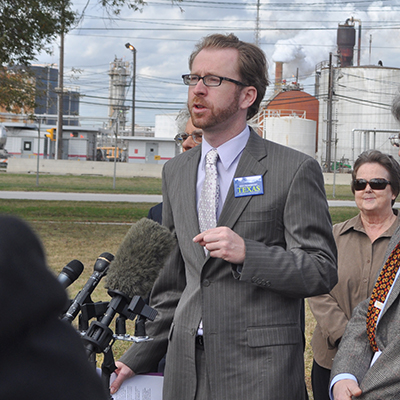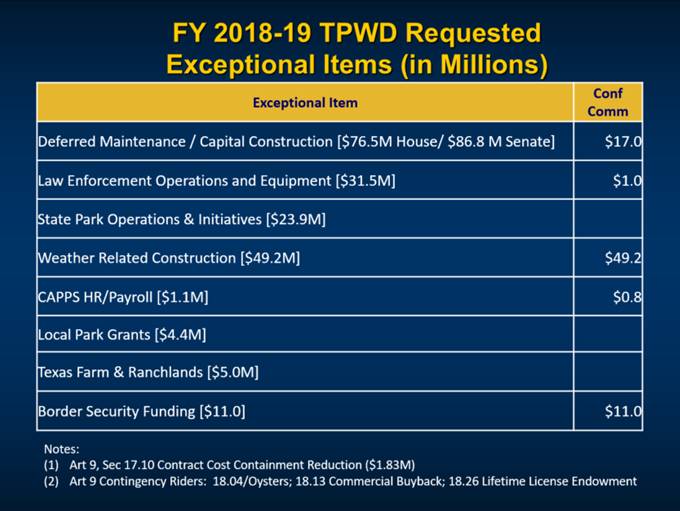
Disappointment for our state and local parks
I am sorry for the delay in furnishing the closing analysis of the appropriations process this cycle as it pertains to the Sporting Goods Sales Tax (SGST) for 2018-2019. However, it took a bit of scrubbing to make sure that it is all here, and we wanted to make sure that there was nothing in the Special Session Call or the Governor’s approval of the budget or his vetoes, which would influence the final outcome.
The following was written by longtime parks advocate George Bristol.
Stakeholders:
I am sorry for the delay in furnishing the closing analysis of the appropriations process this cycle as it pertains to the Sporting Goods Sales Tax (SGST) for 2018-2019. However, it took a bit of scrubbing to make sure that it is all here, and we wanted to make sure that there was nothing in the Special Session Call or the Governor’s approval of the budget or his vetoes, which would influence the final outcome.
First, there is no question that there are some positive outcomes from the Legislative Session. When all was said and done $277.58 million (88.5%) of the $313.5 million of the eligible SGST was appropriated. Given the budget constraints of this Session that is a win. However, the conferees decided to switch the method of finance for the weather-related construction from General Revenue financing to SGST financing in the amount of $49.2 million. There is no question that these dollars are necessary to address all the damage caused by recent floods, fires and storms. However, by making the switch, it left little for deferred maintenance/capital repairs, State Park operations and local park grants. The chart below shows the Exceptional Items requests and the final results:

Part of the problem with this funding is that no room was left for flexibility. This happened even though the Department thought they had a deal to have a final discussion with the members of the conference committee to see if there were areas where such flexibility might be allowed to cover the greatest and most immediate needs across the board. That promise was, in the end, ignored. Thus the Department is faced with no ability to cover equally important or dire needs in existing or new projects.
Think collapsing infrastructure at Goliad, Garner or Colorado Bend State Parks. Or consider new park development at Palo Pinto Mountain, construction at Devils River or planning for Kronkosky or Powderhorn. And oh, by the way, those last four sites have been privately funded to date. Seems to me that the call for private/public partnerships rings falsely hollow, if only one partner meets their obligation.
And by failure to appropriate a dime of the Exceptional Item funding for State Park operations, an immediate problem looms at many of our parks, which are predicted to have growing visitation (18% over last year). Eventually these over-crowded, and understaffed parks, many of which are in dire need of repairs, will drive Texans – and the dollars they spend in the parks and in surrounding communities – away.
And how about those local park grants programs, which are one of the best bangs for our bucks? Not only was the modest request of $4.4 million ignored, insult was added to injury when they handed out a $5 million non-competitive “kiss” to senator Eddie Lucio for a project in his district as a gesture of misplaced gratitude in turn for his vote.
But for the time being, it is what it is. Whether the Department can shift enough funds and personnel around to avoid inordinate visitor delays or park closings remains to be seen.
Yet even with these challenges there should have been and could have been relief in the future with the passage of HB78. As you know, we were all thrilled with the passage of HB158 in 2015. It was to have been the crowning achievement, after years of SGST diversions and budget scams. It was to have been a PERMANENT fix. It was to be the gateway to a healthy park system leading up to the 2023 state park centennial. Applause was given across the state, awards were given out and credit was taken.
It turned out to be another disappointment.
Only shortly before this Session was it discovered that SB1366 (also passed in 2015 as a supposed complement to HB158) in fact negated the purpose and permanency of HB158. Fortunately, the error was found out and Rep. Ryan Guillen moved to correct the flaw by introducing HB78. But he said upfront he needed help and cosponsors.
Without thought or hesitation we turned to our 2015 champion, Rep. Lyle Larson — the lead recipient of awards and applause. But then a strange and fatal thing occurred. Even after visits by me and other key stakeholders where Larson gave an undying pledge of support, he, for all intent and purpose, disappeared. He did not co-sponsor the bill. He did not testify on its behalf. And without his call to action to save his own crowning achievement, it died in committee.
When all is said and done the results of this Session will necessitate a great deal of thought on how best to move forward over the next two years. Each of you will obviously be an important part of that conversation. We’ll be in touch.
George Bristol
Authors
Luke Metzger
Executive Director, Environment Texas
As the executive director of Environment Texas, Luke is a leading voice in the state for clean air and water, parks and wildlife, and a livable climate. Luke recently led the successful campaign to get the Texas Legislature and voters to invest $1 billion to buy land for new state parks. He also helped win permanent protection for the Christmas Mountains of Big Bend; helped compel Exxon, Shell and Chevron Phillips to cut air pollution at four Texas refineries and chemical plants; and got the Austin and Houston school districts to install filters on water fountains to protect children from lead in drinking water. The San Antonio Current has called Luke "long one of the most energetic and dedicated defenders of environmental issues in the state." He has been named one of the "Top Lobbyists for Causes" by Capitol Inside, received the President's Award from the Texas Recreation and Parks Society for his work to protect Texas parks. He is a board member of the Clean Air Force of Central Texas and an advisory board member of the Texas Tech University Masters of Public Administration program. Luke, his wife, son and daughters are working to visit every state park in Texas.

